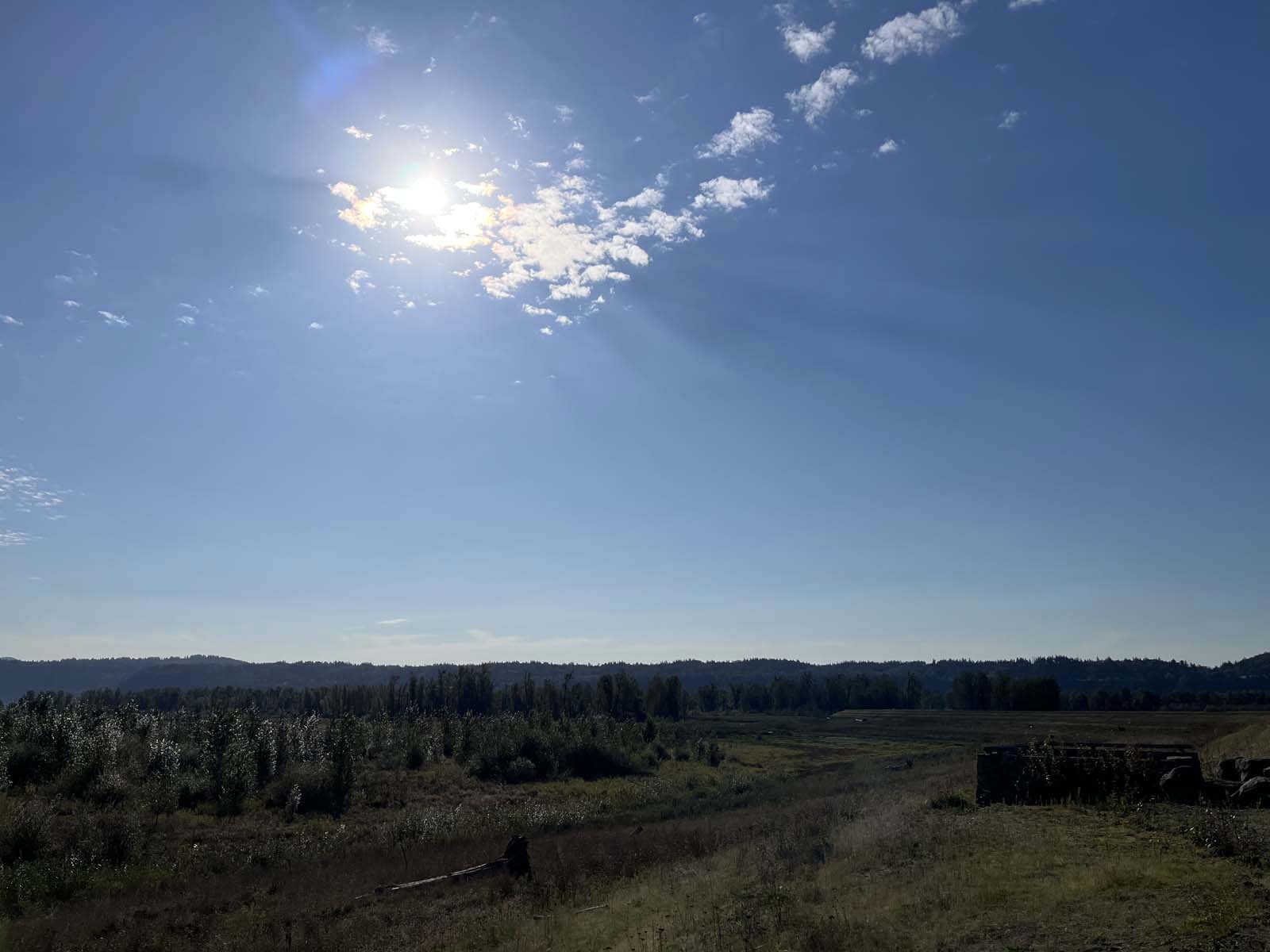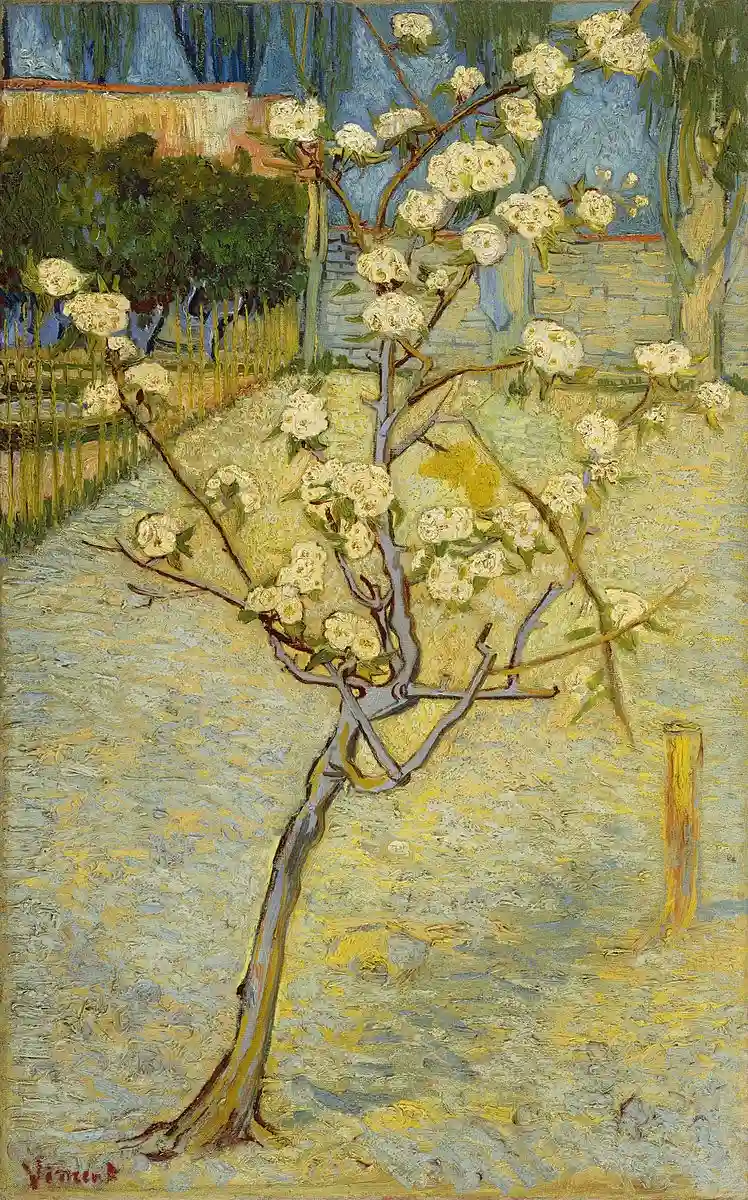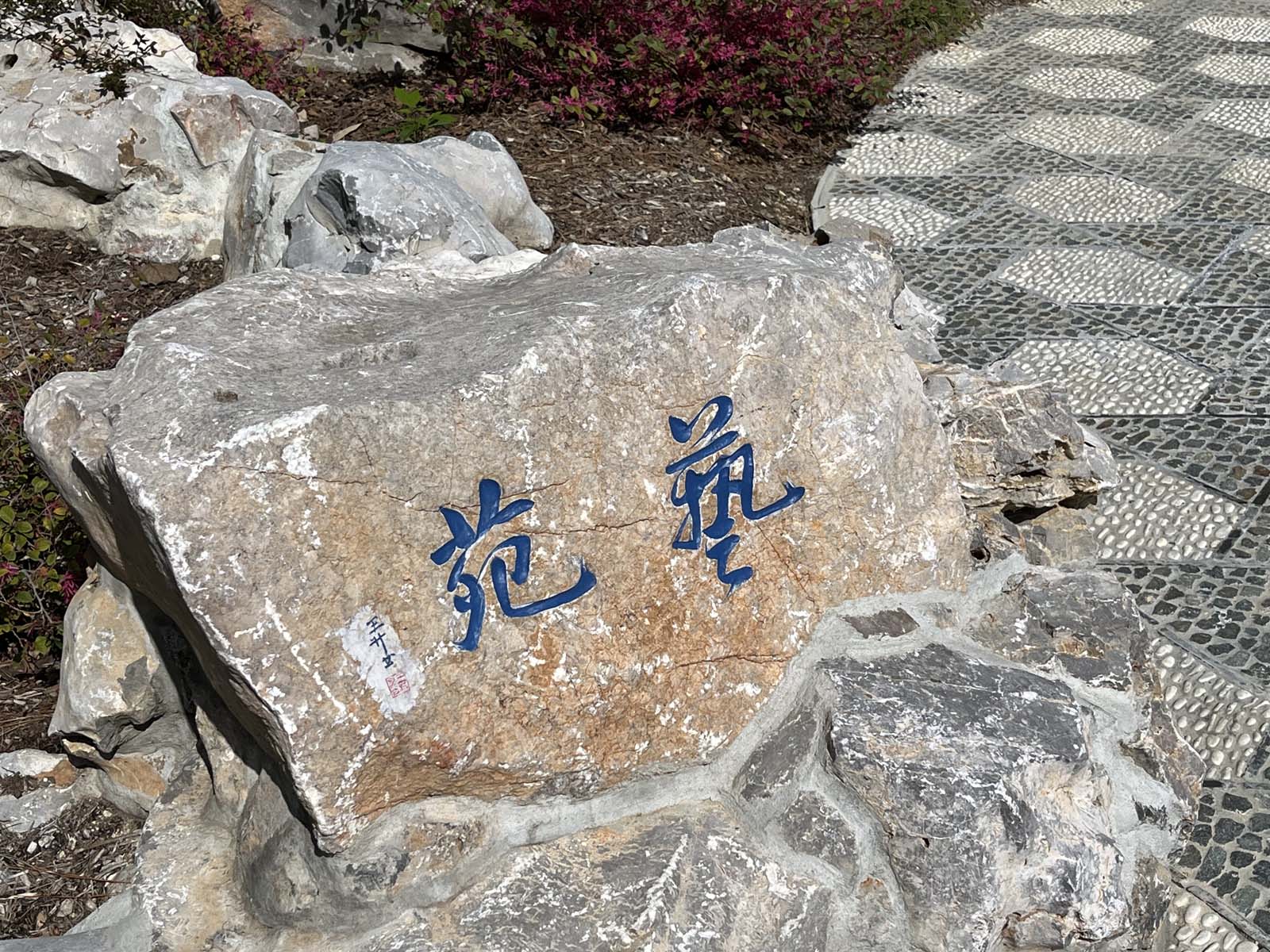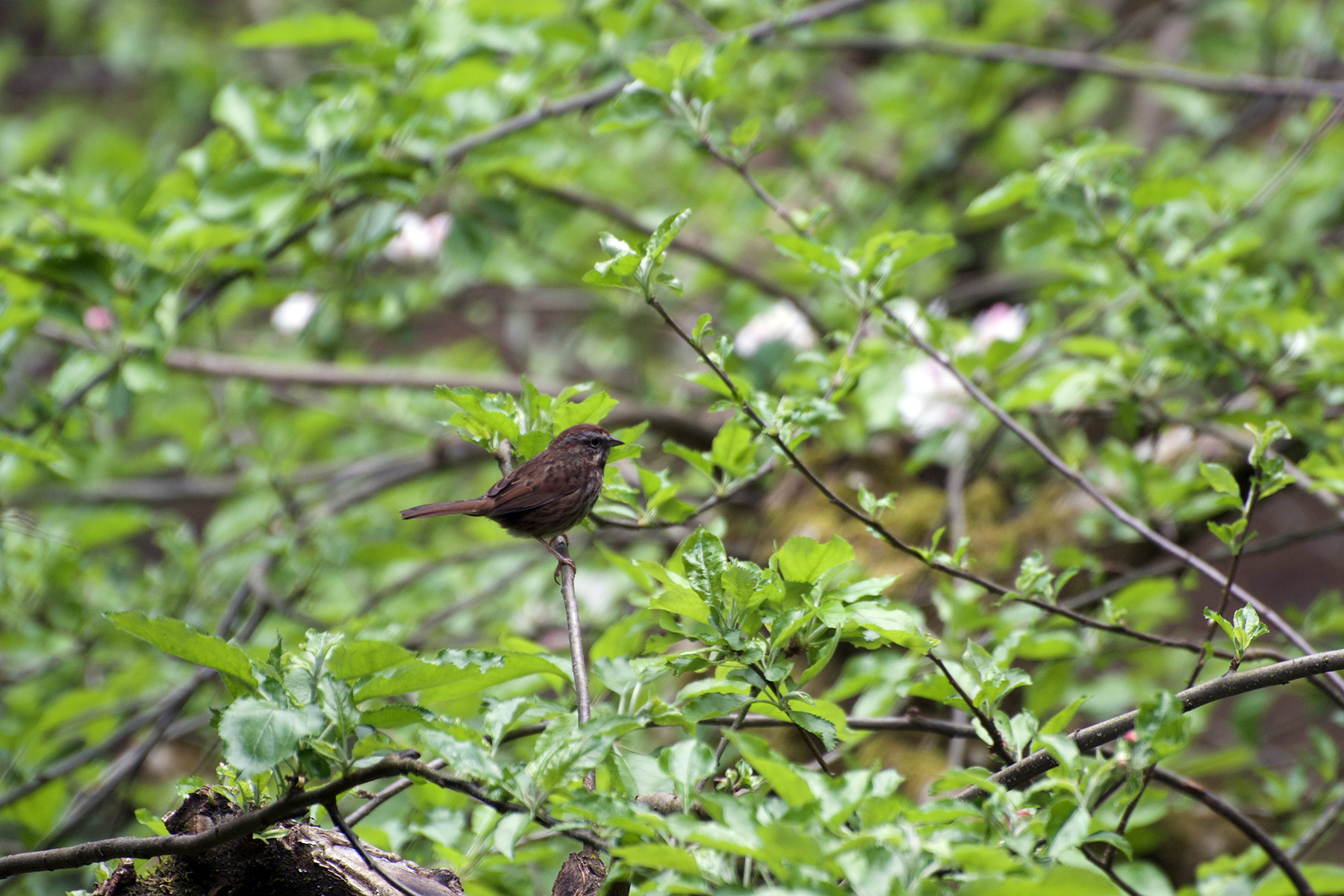I was walking on a dike towards the Columbia river, water levels so low that the geese rested on sand banks in the middle of the sidearm.


Drought had emptied the ponds of all water, colored the landscape with muted browns.

(The brown center is usually a lake)

Leaves of the cottonwoods all silvery in the bright light, mustard yellow on the ground once shed, echoing the lichen.



A few familiars, a harrier hawk, herons and deer, a fearless kestrel advertising the location, an egret flying in search of water. It was hot and it was still, only some isolated chants of geese formations carrying across the meadows, stark light, air shimmering.




If you can’t walk with me through a strangely out-of-season October landscape, find a comfortable spot to sit and read a very long poem. It contains worlds. Cyclic worlds of destruction, worlds of renewal, worlds of despair and ultimately resilience.
It also contains lines that describe perfectly what I experienced yesterday, “summer after summer has ended, … the low hills shine, ochre and fire, even the fields shine… a sun that could be the August sun … a day like a day in summer, exceptionally still.”

I have not been exactly a fan of poet Louise Glück who won the Nobel Prize in 2020, and died this week a year ago. For me, her biting wit too often veered into cruelty. Yet I do see why the Nobel committee awarded Glück “for her unmistakable poetic voice that with austere beauty makes individual existence universal.” She describes the core of coping with trauma regardless of what it was or whom it affected: a person, a people, a planet. There is indeed a universality to the processes she describes, understands and accepts, with a few recommendations toward action or acceptance thrown in.
Having written last week about Kintsugi as a ceramic art form addressing trauma, I thought we might be challenged by looking at poetry that shares some of that approach. Laying bare the scars, acknowledging the irreversibility to a prior state of being, but finding beauty in acknowledgment – there with gold dust as a means of emphasis, here with determined words that claim an untouchable core.


The poem I chose for that purpose is called October. It was written in 2002 as a response to the World Trade Center bombing, and published in Averno in 2006. Lago d’Averno is the name of a deep crater lake near Naples, Italy, thought to be the gateway to the underworld by the Romans. The volume contains several poems describing the myth of Persephone and her cyclical return to earth, with imagery alternating between the destructive world of Hades where she has to reside, and the fruitful world of earth where she is permitted to return to her mother, Demeter, and makes things grow, for periods of time.
22 years later, the poem fits with a world gone mad, whether with personal loss, or the ravages of war, the lure of fascism, or the fears brought on by nature shedding all reserve – through pandemics, or catastrophic changes in climate that lead to the disasters we are now experiencing. It alludes to fear, memory distortion, experienced harm and a refusal to give in to despair, even when we have to acknowledge that we cannot turn to the earth and the planets to rescue us.
Here is my spontaneous take (and you might want to read the poem below first, so I make at least a semblance of sense…):
The first section describes disorientation, a shifting and uncertainty of where the narrator is in time, a loss of a sense of hearing or the ability to decipher meaning. It alludes to pointlessness in trying to anchor herself, no more grasp on reality. It mentions a better, more fertile past where we believed in growing things, in good outcomes. It is a jumble of confusion. Wasn’t life supposed to have a happy ending?
The second section has the narrator reemerge with a strong mind, one that is tested and wary, observing, able to discern that the violence of trauma changed her, harmed a body in ways that cannot be reversed, but a mind now clearly assessing the world that is. Nature is still around, like a bit player, observed but not able to intervene.

Section 3 is given to memory. Remnants of beauty, succor in nature, a world beckoning you to be part of it. Reminiscence makes way to acknowledgment that life can bring pain worse than death. An inkling of defiance, not a submissive nod to saying good bye. So many amazing things to list.
Section 4 starts – for me – to deliver the goods. The poet acknowledges how horrid things have become, how fall (after trauma) contains so much more loss than spring, but she starts to add up what still exists: ideals still burn in us, like a fever or a second heart, music remains, though changed, perceptions are sharpened.
“How privileged you are, to be passionately
clinging to what you love;
the forfeit of hope has not destroyed you.
Maestoso, doloroso:
This is the light of autumn; it has turned on us.
Surely it is a privilege to approach the end
still believing in something.”
Majestic. Painful. A core of us remains intact, despite the horrors, indestructible.

The fifth section reminds us that there is still work to do, work that can be done, and that we are not alone in all of this, whether in collective grief or through collective action.
And lastly, section six seems to sink into the depth of defeat, acknowledging the destruction of a barren earth, no longer nurturing, no longer an option to act as a rescuer. But then the moon appears, with the last lines referring to beauty and friendship. There is no illusion that the moon will do what the earth can no longer, but the concepts of beauty and friendship counteract hopelessness, suggesting there are still forms of connection.
Like in real trauma work, the alternations of drowning and lift-up, of cycling between hope and despair, of past and future orientation, allow us to spiral upwards on our own path towards healing.
“How privileged you are, to be passionately clinging to what you love.”
Maybe it’s privilege. Maybe it’s grace. Maybe it’s simple grit, refusing to give up.
I’ll cling as long as I want to, trauma be damned. I’m not forfeiting hope either, let me tell you. There is still too much work to do. (And I hope I’m not eating my words after the election. Then again, remember what Persephone and Demeter, central figures in the Eleusinian Mysteries, promised true believers: a happy afterlife. Looks like we have one final shot…)



October
1.
Is it winter again, is it cold again,
didn’t Frank just slip on the ice,
didn’t he heal, weren’t the spring seeds planted
didn’t the night end,
didn’t the melting ice
flood the narrow gutters
wasn’t my body
rescued, wasn’t it safe
didn’t the scar form, invisible
above the injury
terror and cold,
didn’t they just end, wasn’t the back garden
harrowed and planted—
I remember how the earth felt, red and dense,
in stiff rows, weren’t the seeds planted,
didn’t vines climb the south wall
I can’t hear your voice
for the wind’s cries, whistling over the bare ground
I no longer care
what sound it makes
when was I silenced, when did it first seem
pointless to describe that sound
what it sounds like can’t change what it is—
didn’t the night end, wasn’t the earth
safe when it was planted
didn’t we plant the seeds,
weren’t we necessary to the earth,
the vines, were they harvested?
2.
Summer after summer has ended,
balm after violence:
it does me no good
to be good to me now;
violence has changed me.
Daybreak. The low hills shine
ochre and fire, even the fields shine.
I know what I see; sun that could be
the August sun, returning
everything that was taken away—
You hear this voice? This is my mind’s voice;
you can’t touch my body now.
It has changed once, it has hardened,
don’t ask it to respond again.
A day like a day in summer.
Exceptionally still. The long shadows of the maples
nearly mauve on the gravel paths.
And in the evening, warmth. Night like a night in summer.
It does me no good; violence has changed me.
My body has grown cold like the stripped fields;
now there is only my mind, cautious and wary,
with the sense it is being tested.
Once more, the sun rises as it rose in summer;
bounty, balm after violence.
Balm after the leaves have changed, after the fields
have been harvested and turned.
Tell me this is the future,
I won’t believe you.
Tell me I’m living,
I won’t believe you.
3.
Snow had fallen. I remember
music from an open window.
Come to me, said the world.
This is not to say
it spoke in exact sentences
but that I perceived beauty in this manner.
Sunrise. A film of moisture
on each living thing. Pools of cold light
formed in the gutters.
I stood
at the doorway,
ridiculous as it now seems.
What others found in art,
I found in nature. What others found
in human love, I found in nature.
Very simple. But there was no voice there.
Winter was over. In the thawed dirt,
bits of green were showing.
Come to me, said the world. I was standing
in my wool coat at a kind of bright portal—
I can finally say
long ago; it gives me considerable pleasure. Beauty
the healer, the teacher—
death cannot harm me
more than you have harmed me,
my beloved life.
4.
The light has changed;
middle C is tuned darker now.
And the songs of morning sound over-rehearsed.
This is the light of autumn, not the light of spring.
The light of autumn: you will not be spared.
The songs have changed; the unspeakable
has entered them.
This is the light of autumn, not the light that says
I am reborn.
Not the spring dawn: I strained, I suffered, I was delivered.
This is the present, an allegory of waste.
So much has changed. And still, you are fortunate:
the ideal burns in you like a fever.
Or not like a fever, like a second heart.
The songs have changed, but really they are still quite beautiful.
They have been concentrated in a smaller space, the space of the mind.
They are dark, now, with desolation and anguish.
And yet the notes recur. They hover oddly
in anticipation of silence.
The ear gets used to them.
The eye gets used to disappearances.
You will not be spared, nor will what you love be spared.
A wind has come and gone, taking apart the mind;
it has left in its wake a strange lucidity.
How privileged you are, to be passionately
clinging to what you love;
the forfeit of hope has not destroyed you.
Maestoso, doloroso:
This is the light of autumn; it has turned on us.
Surely it is a privilege to approach the end
still believing in something.
5.
It is true there is not enough beauty in the world.
It is also true that I am not competent to restore it.
Neither is there candor, and here I may be of some use.
I am
at work, though I am silent.
The bland
misery of the world
bounds us on either side, an alley
lined with trees; we are
companions here, not speaking,
each with his own thoughts;
behind the trees, iron
gates of the private houses,
the shuttered rooms
somehow deserted, abandoned,
as though it were the artist’s
duty to create
hope, but out of what? what?
the word itself
false, a device to refute
perception— At the intersection,
ornamental lights of the season.
I was young here. Riding
the subway with my small book
as though to defend myself against
the same world:
you are not alone,
the poem said,
in the dark tunnel.
6.
The brightness of the day becomes
the brightness of the night;
the fire becomes the mirror.
My friend the earth is bitter; I think
sunlight has failed her.
Bitter or weary, it is hard to say.
Between herself and the sun,
something has ended.
She wants, now, to be left alone;
I think we must give up
turning to her for affirmation.
Above the fields,
above the roofs of the village houses,
the brilliance that made all life possible
becomes the cold stars.
Lie still and watch:
they give nothing but ask nothing.
From within the earth’s
bitter disgrace, coldness and barrenness
my friend the moon rises:
she is beautiful tonight, but when is she not beautiful?
by Louise Glück

Here is Mahler’s Der Einsame im Herbst ( The lonely one in fall.) Das Lied von der Erde.

























































































































